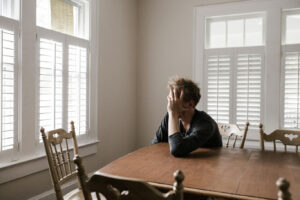Seasonal Affective Disorder in Recovery: How To Overcome SAD, Sober
Winter (or summer) depression is real, and can be a real burden on recovery. Understand what it is and learn some tools for pulling through it

You know the drill — because it happens every year — but that doesn’t make it any better. Starting around late November and lasting through roughly forever, it’s cold and gray outside all day, and then it’s nighttime in the middle of the afternoon, somehow. The holidays are stressful, or over. The flu is everywhere.
Plenty of people get a little more sluggish and a little more peevish during the winter months, but some struggle with significant mood changes during certain seasons. If you’re one of them and you’re also in early recovery, it can feel like a one-two punch.
Seasonal affective disorder, or SAD, is 1) yes, a real thing, 2) a depressive disorder that affects many people, and 3) a mental health issue you can work through with the right help and tools.
Like other mental health disorders that co-occur with substance use disorder (SUD), SAD can complicate recovery. But the strategies and coping mechanisms of recovery can often help alleviate SAD, and if you’re having a rough go of it this winter, there are myriad treatments that can help you get past these struggles.
What Is Seasonal Affective Disorder? Is It Linked to Addiction?
The National Institute of Mental Health (NAMI) defines seasonal affective disorder as a type of depression that causes “significant changes in your mood and behavior whenever the seasons change.” These mood changes are similar to what one experiences when struggling with clinical depression year-round.
There are two types of SAD. These are winter-pattern SAD (which is more prominent) and summer-pattern SAD. While they are classified separately, their symptoms are very similar.
Many people may find it easy to dismiss SAD because they prefer one season to another, but seasonal preference is not to be mistaken for seasonal affective disorder. Winter-pattern SAD is not merely “the winter blues.” The symptoms of seasonal affective disorder mirror those of major depression — which can be severe and devastating if not treated properly.
Research on the topic suggests that there is indeed a correlation between substance use disorder, specifically alcohol use disorder, and SAD, and that one can aggravate the other. That’s no surprise: After all, SAD is a mood disorder, and about half of people with mental health disorders grapple with a co-occurring substance use disorder (and vice versa).
What Are the Symptoms of Seasonal Affective Disorder?
Before looking at some of the specific symptoms of SAD, it is helpful to understand what the symptoms of major depression are, as SAD is a form of depression. According to NAMI, some of the common symptoms of depression are:
- Feeling depressed most of the day, nearly every day
- Losing interest in activities you once enjoyed
- Experiencing changes in appetite or weight
- Having problems with sleep
- Feeling sluggish or agitated
- Feeling hopeless or worthless
- Having frequent thoughts of death or suicide
These symptoms can also be present in seasonal affective disorder. So, again — let’s not dismiss it as the winter blues.
Winter-Pattern SAD
In addition to these foundational symptoms of major depression, there are some specific additional symptoms of winter-pattern SAD:
- Sleeping too much (hypersomnia)
- Eating more than normal
- Withdrawing from social activities
Summer-Pattern SAD
And some of the specific symptoms of summer-pattern SAD:
- Poor sleep patterns, including not sleeping enough (insomnia)
- Eating less than normal, having little to no appetite
- Feeling restless and agitated
- Unexpected episodes of violent behavior
If you experience any of these symptoms — or a combination of many — we encourage you to seek help immediately, no matter what time of year. You need not feel apprehensive about getting help, and you are not alone. Millions of people struggle with seasonal affective disorder every year, and millions come through it.
Who Experiences Seasonal Affective Disorder? How About in Recovery?
Anyone can struggle with SAD, but it is more likely to affect those suffering from depression. However, if you have not been previously diagnosed with depression, that does not mean that you are immune from seasonal affective disorder.
SAD is often associated with how our bodies react to various environmental changes. This is especially true with winter-pattern SAD. So, folks that live in areas that experience long winters are often more susceptible to seasonal affective disorder.
As with any co-occurring mental health issues, SAD can be exacerbated by addiction and can throw a wrench into recovery. It’s always worth keeping tabs on your mental well-being in recovery (and in general), and remember that you have people you can talk to: a counselor, a sponsor, peers in recovery, family and friends.
Can Seasonal Affective Disorder Be Treated? How?
If you feel like you may be dealing with seasonal affective disorder, many treatment options can help you feel better.
Light Therapy
According to the medical journal Depression Research and Treatment, “Sunlight plays a critical role in the decreased serotonin activity, increased melatonin production, disrupted circadian rhythms and low levels of vitamin D associated with symptoms of SAD.” Light therapy utilizes a synthetic light source to imitate sunlight and thus helps alleviate some of these disruptions that cause SAD.
Supplements
Another way of potentially treating seasonal affective disorder is to take vitamin D supplements. While light therapy is used to increase melatonin production, these supplements help increase vitamin D levels in the body. Recent research shows that vitamin D supplements may have a moderating effect on depressive symptoms.
Talk Therapy and Medication
Lastly, don’t rule out traditional talk therapy and medication, which can be highly effective in treating SAD. Talk therapy can help you get to some of the emotional or traumatic root causes of the depressive aspect of SAD. Some medications can help with the decreased serotonin levels caused by SAD and other chemical imbalances that may exist in the brain.
Author Madeleine L’Engle wrote that “maybe you have to know the darkness before you can appreciate the light.” Interpret that how you like when it comes to SAD or SUD. But you’ve known enough darkness in addiction that you deserve to appreciate the light year-round in recovery.
More Help & Information
Sobriety vs. Recovery: What's the Difference?
Are the concepts themselves up for debate? Do they require certain treatments, or abstinence from everything? It's complicated! And new ways of thinking are changing the conversation.
Now Elite NFL Players, They First Tackled Addiction | News Roundup
All Sober compiles the best of the latest headlines. Here's your addiction and recovery news for the week of Feb. 19, 2024!
Help Them Help You: Explaining Your Mental Health to Your Family
Your mental health can affect — and be affected by — your loved ones. Here's how to discuss it with them so everyone can heal.
Dry January (and Beyond): The Possibilities Are Endless
There's never been a better time to go sober. Whether you're trying it out this month or already living the life, join us for some tips, ideas, inspiration — and maybe even new friends.
Sober Holiday Tips: Meeting 'Share-a-Thons'
Need to get out of the house for a bit and see some friendly sober faces? Recovery support group meeting marathons run 24/7 from Christmas Eve through New Year's Day.
What Happens After an Intervention?
Your loved one agreed to get treatment for addiction during their intervention — or not. Here's what you need to know about what comes next.
We're in This Together: Building a Healthy Sober Support Network
You are the captain of your recovery, but you don't have to do it alone. A sober support network will lift you up in tough times and celebrate your triumphs.
Real-Life Recovery Tips: Phone a Friend
When you're traveling, you can take your sober support network with you — right in your pocket. Rocker Kasim Sulton shares his top recovery tip in this video.











